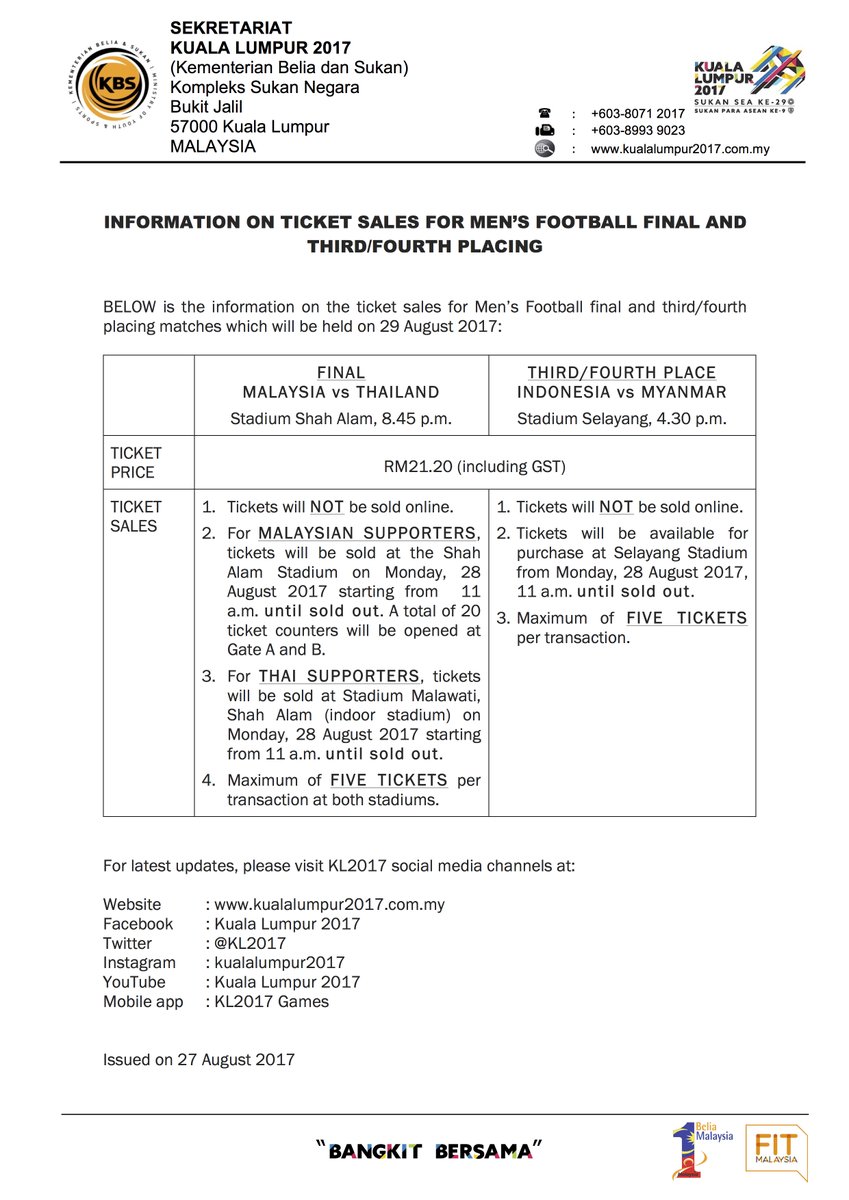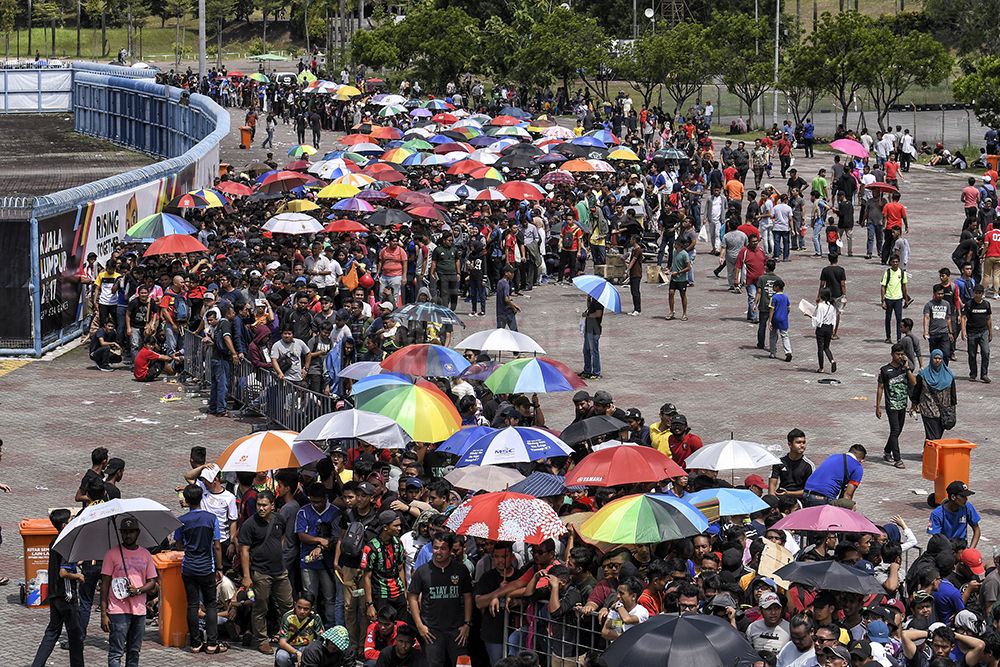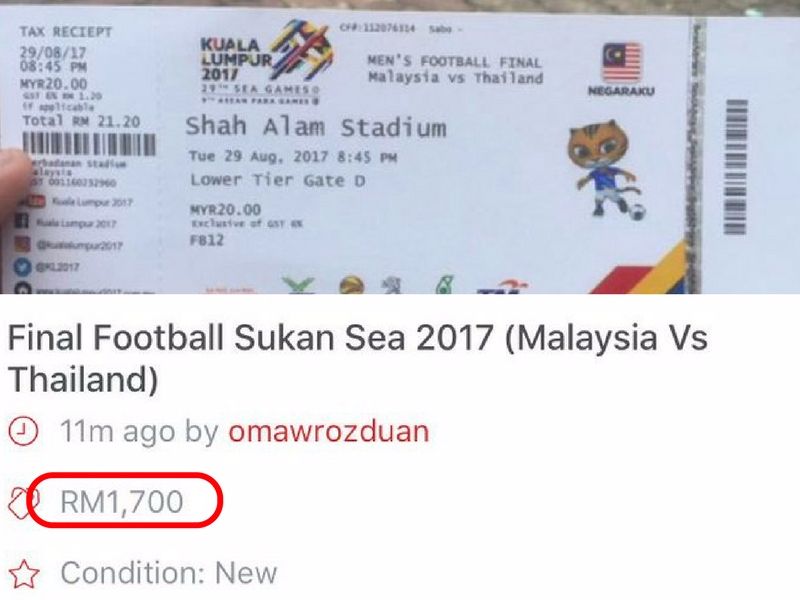Last night’s Msia vs Thailand tickets were sold for up to 10 TIMES the normal price! Is that even legal?

- 1.0KShares
- Facebook950
- Twitter2
- LinkedIn8
- Email18
- WhatsApp25
In case you missed what happened last night, Malaysia lost to Thailand at the finals for the football event at the 2017 SEA Games 0-1. That one goal happened at the 38th minute, when the Malaysian goalkeeper Haziq Nadzli accidentally punched the ball into Malaysia’s own goal. Malaysia failed to catch up afterwards, giving Thailand a gold medal and scoring a silver for Malaysia.
That’s what happened to the Malaysian football team yesterday. But do you know what happened to their fans? Many of them could not get a ticket for yesterday’s match, partly due to the 29th Kuala Lumpur SEA Games organizer announcing that they won’t be selling the tickets for the football event finals (Malaysia vs Thailand) online last Sunday night.

This posed a problem for some people, as tickets were to be sold the morning after the announcement. People not living anywhere near the Shah Alam won’t probably be able to get there in time to queue up and buy the tickets, as pointed out by several politicians. And what a long queue it was.

People started lining up from as early as midnight, and not everyone who queued up managed to secure themselves tickets. The reported number of tickets sold vary, with optimistic sources estimating 60,000, some 50,000 and some only 40,000. Regardless, these tickets were sold out in two hours.
Some fans were pretty frustrated about it, as the announcement was kinda sudden. However, judging by the crowd at the finals, it seems that everyone somehow got themselves a ticket, either legally, through reserved tickets, using runners or perhaps, buying them from scalpers.
Scalpers were selling tickets for anywhere between RM100 to RM1,700

Tickets for football events can be bought online before, so the announcement caused a mad scramble for tickets. As to why this happened, the Minister of Youth and Sports Khairy Jamaluddin had stated that due to the high volume of tickets to be sold, the online payment service provider had informed him on Sunday that they could not guarantee reliable transactions. There is a possibility that some online buyers will not be able to redeem their tickets after making their payment.
“I had a decision to make with that information given to me. Without a stable online payment gateway, a decision was made to sell all @ SSA.” – Khairy Jamaluddin, in a Tweet.
Regardless of why things turned out this way at the very last minute, some enterprising people saw this as a chance to sell the RM21.20 tickets at jacked up prices, with a source reporting a price of RM1,700 per ticket. While some of these scalpers attributed the high prices to their effort of standing in line for hours for five tickets per person, others seem to have gotten their hands on the tickets through questionable means.

Rumors were circulating on social media that only 50,000 tickets were actually sold to the queueing people, causing some fans to miss the opportunity to buy them through normal means. The rest of the tickets were said to be allocated for sponsors, sold to Thailand supporters, and a number were given out for free to certain organizations. However, no official statements on the matter had been posted online yet, except for one from Khairy saying that they will see what can be done about this.
“We’ve already limited the sale of the tickets to only five per person, but there might be some who tries to sell it at a higher price after buying it through someone else. We will see what action can we take. We’ll see what will happen,” – Khairy Jamaluddin, for Stadium Astro.
Is there anything to be done about them darn scalpers?
Scalping tickets may sound illegal, but technically it’s not. The Penal Code said nothing about buying (or getting) tickets in bulk and reselling it at obscene prices. As to whether action can be taken on the scalpers, according to our friends at AskLegal, the answer to that may lie on the tickets themselves. Specifically, on the backs of those tickets.

Although it may not seem like it, a ticket can be legally seen as a contract. When you buy a ticket, either for an airplane, a concert or a sporting event, to name a few, you enter a contract with the ones selling those tickets. And as long as the ticket is valid, both you and the ticketing agent are bound by the terms written on the back of the ticket. This is why you can (or sometimes can’t) ask for a refund if your train is too late or if a show was cancelled, depending on the terms written on the ticket.
In the case of the football finals tickets, among other things the terms and conditions at the back of the tickets include this:
“Tickets obtained or purchased from or through persons other than KL2017 authorized sources, shall be void and may be cancelled without refund or entry to a Session. Tickets used for advertising, promotions, fundraising or marketing purposes without the authorization of KL2017 or the OCM, shall be void and may be seized or cancelled without refund or entry to a Session. Such cases may be considered illegal.” – From the backs of the tickets, but can also be read here.
In other words, if you didn’t buy the tickets from the sources approved by KL2017, the contract is breached, and the tickets will be considered invalid. While we do not have set punishments for ticket scalpers, we do have the Contracts Act 1950, which puts forth in Section 74 (1)
“When a contract has been broken, the party who suffers by the breach is entitled to receive, from the party who has broken the contract, compensation for any loss or damage caused to him thereby, which naturally arose in the usual course of things from the breach, or which the parties knew, when they made the contract, to be likely to result from the breach of it.”
The barcode seen on the tickets as well as the terms behind the ticket had implied that there would be measures against scalping, like using the barcode to detect ticket bearers who did not buy them from legitimate sources, as well as having to present your Identity Card along with the ticket during admission. However, people who lined up to buy the tickets reported that there was no registration done during the purchase, and therefore no way of keeping track of where the stadium patrons get their tickets from.
When things like this happen, the Malaysian sports industry suffers

The sudden unavailability of online ticketing, plus a lack of tickets and the prevalence of scalpers left many Malaysian football supporters frustrated. Ultras Malaya, one of the big supporters of the Malaysian football scene, had stated that they won’t come and cheer for the Malaysian team at the finals. This was said to be a form of protest against the system of selling tickets for the final match, where a lot of fans had to go home empty handed even though they went so far as to take a day off from work just to line up to buy tickets.
Faisal Karim, the CEO of StubApp, an online ticketing app for the Malaysian Football League, suggested that the event organizers invest in a Ticketing Department as ticket sales constitutes a significant portion of a football club’s earnings.
“If that’s not affordable, appoint a Ticketing Officer that has the freedom to effectively and creatively handle the ticket sales.” – Faisal Karim, CEO of Stubapp, as reported by Semuanyabola.com
While Malaysia may not have won the gold medal in last night’s game, the whole situation with the tickets and the frustration of the fans showed how Malaysians really stood behind their football team, being willing to queue up and stand for hours just for a chance show their support and to watch the match live. And despite a lot of the tickets being sold at multiple times its normal price, the stadium was packed to the limit during the finals. Organizers would do well to take that into consideration when providing ticketing services in the future.
[This article was co-written with Ahmad Zahid of SOSCILI]
- 1.0KShares
- Facebook950
- Twitter2
- LinkedIn8
- Email18
- WhatsApp25



